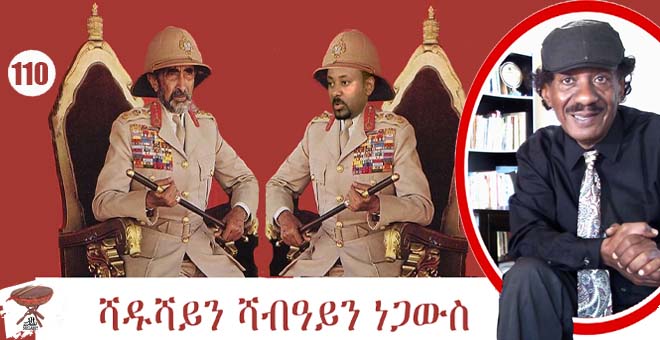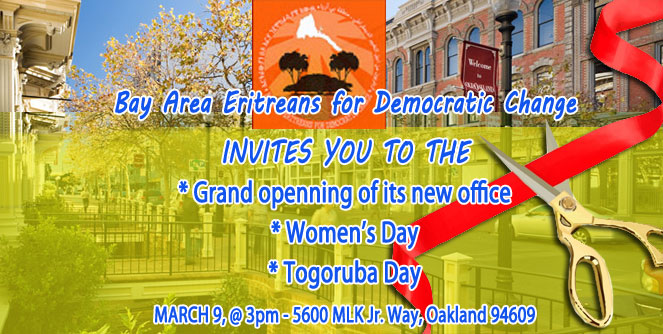The Sixth and Seventh Kings of Ethiopia
A man from Keren arrived in Asmara and headed to the neighborhood where his relatives lived. Though he had seen the house long ago, he was not sure exactly where in was. Then he saw his relatives’ son sitting on the stairs of a door. He kissed the boy and asked if his parents were in. “Yes, they are in drinking coffee,” the boy said. The man knocked at the door, but no one answered. In surprise he asked the boy, “you said your parents are in, why don’t they open the door?” The boy innocently replied, “but this is not our house!” He then showed him the right door, two houses up the street.
Children do not think beyond what they hear but elders make assumptions. And most of the time, assumptions are disastrous. In other words, if you ask expecting a specific assumed answer, be prepared for a surprise. Smart questions get smart and specific answers.
Why are we in an abhorring situation? Forget your assumed explanations and leave a margin of doubt. If you are asking a question it means you do not know the answer; you must realize that. Expect answers with an open mind–if you already know the answer, why ask? Asking is a testimony that you have no clue, or you are doubtful.
We are where we are because we have ready-made explanations and indoctrinations that conform to our arrogance, inflated egos, and self-centered. And of course, wishful thinking. We claim that we respect human rights and equality of people under the law, we claim that we belong to compassionate, wise society. Can we convince a neutral objective person with our convictions? Most of the time we can’t.
The Unjust Expulsion of Eritreans in 1998
In 1998, a tragedy engulfed Ethiopians of Eritrean ancestry in Ethiopia. I am sure many remember that tragedy vividly. Remember how infuriated we were as a nation, so angry at the expulsion that we raised it on every occasion “hzbna z’segogu”? Okay, it was bad and painful. But was our outrage genuine? If so, why are we not reacting a similar outrage like in 1998? We see it happening again in many ways–people being uprooted, their lives endangered, yet, the shameless among us are cheering for it. But what do you know, in the future, provided they get a chance, the same people will deafen us with their fake outrage! These heartless maniacs do not care about human sufferings but their ego. Their behavior is primitive, animal-like. They were neither sad for what happened to the deportees in 1998, nor for those maimed or killed. And they do not care for the suffering that is now happening under their eyes. If they were genuinely concerned, they would have done their best to stop the carnage. They are merchants of death.
The Seventh king
When colonel Abiy came to power in April 2018, I was optimistic and liked him. However, by June 2018, I gave up on him when he started to use Eritrea as a steppingstone to expand his influence and promote himself. And that theatrical gesture earned him a Nobel Prize from the naïve Norwegian Nobel Prize committee. To date, Eritreans have not seen any peace, and their situation is worse. Those who still say he recognized Eritreans sovereignty; they have nothing to back up their claims with.
The colonel could have ordered his troops to pull out of the occupied territories, he didn’t. He is the commander in chief of the Ethiopian army, if he was not, he wouldn’t have ordered them to fight their own Tigrayan citizens. How is pulling out his army more difficult than ordering them to wage a war?
At this moment, Eritrea is crowded with Tor Serawit (the Ethiopian army) and they are promenading in the streets just like they did before the independence of Eritrea. In 1991, Eritreans pushed them out through the door; in 2020 they returned through a window. Worse, last week the federal Ethiopian forces and the Tigrai forces fought a fierce battle around the Senaafe region, an Eritreans territory with a glorious history in the struggle for liberation. If that didn’t shock you, your conscience is numb.
A few months ago, I asked an old lady who admired Abiy as much I did in the beginning. I jokingly said to her, “I wish my mother told me I will be the seventh king, I would have made a better king than Abiy” She told me, “You are Eritrean, and you can’t be a king.” I laughed it off though I had the urge to tell her. If I were to become a King, maybe colonel Abiy would have offered me a crown from his collection in the museum crowns of so-called “Solomonic kings.”
I did’nt think Abiy will become a king until I realized he has become one, imitating the sixth king and becoming an absolute dictator–what is missing in his speech is “Egna,” the royal “we.” And if he succeeds in his campaign of subjugating part of the over 100 million Ethiopians, I see him upgrading his goal to expanding his empire just like the sixth king and his predecessors did.
I have a few Ethiopian friends who do not like me mentioning their sixth king (Haile Selassie) just like they don’t like me mentioning their seventh king (Colonel Abiy). But Eritreans have memories: In a few days we will remember the Ona massacre’s 50th anniversary. It was one of the many atrocities that never saw a closure. Soon I will come to tell you about the seventh king, Ashger, a code word coined in Keren to mean Haile Selassie without attracting attention. Honest Eritreans are not going to dance during the commemoration but reflect and remember the atrocities committed on innocent villagers of Ona and Besekdira. I will try to remind Ethiopians why most Eritreans do not trust their elite and their warrior character and medieval Abyssinian mentality. And as a prelude to the Ona story, let me tell you about the smile of a Kurdish girl I met in Baghdad during the invasion of Kuwait.
Arjin, the Kurdish Girl
I have lived surrounded by violence and miseries–all caused by cruel and atrocious dictators. In 1990 I was in Kuwait when Iraq invaded the country. In a few days, the city looked like a garrison– not because of the battles, there was not much of it, but because of the looting, the wanton destruction of properties, breaking store fronts, car showrooms, warehouses and anything that has something worth stealing. And soldiers have no taste—they damaged beautiful buildings by blocking the windows with cement bricks leaving a peephole through which they could shoot.
One day we accompanied a family to Baghdad, around 430 miles away. They were on their way to Turkey and beyond for safety. We went to a hotel and found the lobby crowded—there were not enough beds in the whole of Bagdad that could accommodate the thousands who flocked there. It was in such a situation that I was surprised to see a girl leaning on the hotel reception counter flashing a wicked looking smile. I wondered what was there to smile about! I couldn’t control my curiosity and asked her “what is funny.” After a long silence she said, “I am trying to cover the pain inside me with a fake smile.” Then we chatted and she told me her story. Her name is Arjin.
In 1998 Saddam Hussein attacked Halabja, a Kurdish town in Iraq, and bombed it with deadly chemical weapons. Around [5000] people died and twice as much injured. Arjin was there, she trekked to Baghdad alone after she lost both her parents and a sister. Her other sister and brother disappeared, and she didn’t know their whereabouts. She said, “I was in a worse situation than you refugees from Kuwait when I arrived in Baghdad about two years ago.”
Such politician-induced miseries are too painful, whether one experienced it firsthand or heard about it. But one must be human to feel and sympathize with the victims. One must be caring enough to know its destructive effects. And that is why all sensible people should reject violence and injustice. If we allow it on our enemies, we are bound to allow it against our own, even against our family. And we have examples of such husbands, wives, children, and parents who are cruel to their own. Sadly, no one can stop violence singlehandedly. Violence has been a characteristic of human beings since creation. Only a cultural awakening can stop it.
The Abyssinian Culture
I am convinced that only a culture that values human life can stop it. Only a political culture that recognizes and respects the rights of citizens can stop it. And that is why I argue believe reforming and revolutionizing our culture is the only path to an enlightenment and modern society—it’s 2020 and we cannot afford to live with the luggage of a primitive culture. Importantly, we must learn to care for and respect life. And that begins with preparing a modern curriculum for schools where children will learn how to treat the weak and the vulnerable, how to avoid wars, and how to establish a just, fair, and equitable society.
Battles and Wars
Unlike wars that may take years, battles may take a few minutes, an hour, or a day; some might take a bit longer. Unfortunately, battles and wars has been the Abyssinian favorite pastime for centuries. But the tag of war between Tigrayan and Amhara elite stands out as the most destructive. The rest of the people in the region have been and still are the fuel of that fire. Why?
That is the right question I mentioned above. How many wars non-Abyssinians start in the history of the region? Good luck making comparisons. And it was always a tag of war—one side subjugates the others for two or three generations, and then the other side replaces in as a subjugator. That despicable cycle has raged around the region for ages.
A war is a long-protracted chain of battles. Battles end in a short time and one can see the winner and lose quickly. Wars may take a long time. But who am to tell you that? Many of you have taken part in battles, many of you are veterans of the struggle era and the Badumme war. The Eritrean struggle for independence was a thirty-year long war; many battles were fought in that war. The warring sides lost or won many battles. But at the end, Eritreans won the war and were able to push out the Tor Serawit and their cruel legacy. Unfortunately, though the focus stayed on the occupiers, Eritreans didn’t realize they were breeding a brutal dictatorship that inherited the cruelty of “ancien régime.”





Awate Forum